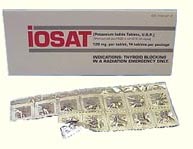Would you like to make this site your homepage? It's fast and easy...
Yes, Please make this my home page!
Conclusions
Have we solved the problem?
In the course of our research we learnt about the dangers of hyperthyroidism and goitre which are both deficiencies of the thyroid gland. They are cause by an excessive intake of iodine in people with a slightly damaged thyroid gland.
Therefore we cannot suggest that the public begin consuming huge amounts of the foods which we have proven to contain quantities of iodine.
If we were to suggest that the public have sufficient amounts of iodine for thyroid blocking in their glands permanently, it would have to be done gradually to prevent the public from developing the deficiencies mentioned above.
So our solution is that small quantities of iodide be added to common daily foods so that there is an increase in the public's iodine intake.
We learnt that even if the necessary amount of iodine for thyroid blocking is not present in the gland, an iodine-rich diet contributes to thyroid blocking and the effectiveness of the actual iodine tablet.
A small quantity of iodine gives people time to get tablets and there is less room for radioactive iodine.
We found this quote via the internet:( www.ki4u.com)
" Any dietary iodine sources providing for a normal daily sufficient regimen of iodine intake (about 150 micrograms/day in adults) is preferred in that it will then take less stable iodine (and time) to saturate your thyroid in a nuclear emergency and there will be less room there for radioactive iodine before you do. An iodine sufficient diet will also greatly increase the effectiveness of KI or KIO3, but primarily only in the following limited context and not as a substitute for KI or KIO3:
An iodine sufficient diet is most beneficial, compared to an insufficient iodine diet, when the initial administration of KI had been unavoidably delayed and the KI could only be first taken after exposure to radioiodine."

We found that only one food company already added iodide in this form to their foods. This was SMA baby foods.
However, since adults do not consume these foods, they are not consuming any sufficient quantities of iodine in their daily diet. We feel that even if only 50mcg of iodide were present in every 100g of powdered soups etc. This would give the public iodine-rich diets, which is obviously very beneficial judging from the quote shown above.
If these recommendations/suggestions were put into practice, the public would definitely have constant iodine-rich diets and there would also be a decrease in the amount of people with IDD (Iodine Deficiency Disorder)
We feel that our experimental methods were as accurate as possible. We performed the titration to confirm the concentration of the Milton solution.
After all who knows when an accident may occur at a nuclear facility near us....Since we could never predict this kind of occurrence, the only constant preparation measure which we can put into practice is to maintain an iodine-rich diet which would enhance the effectiveness of an iodine tablet taken afterwards. So...
Be Prepared...
